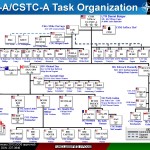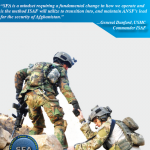
Public Intelligence has obtained the most recent version of the U.S. Civil-Military Strategic Framework for Afghanistan, the second revision of the document dated August 2013, detailing the U.S. government’s goals and priorities for rebuilding Afghan society. Issued by the U.S. Ambassador to Afghanistan James Cunningham and signed by the commander of U.S. forces Joseph Dunford, the framework covers U.S. priorities related to governance, the rule of law, socioeconomic development as well as the gradual transfer of authority to the Afghan government. When compared with a previous version of the framework from March 2012, also obtained by Public Intelligence, the document solidifies the prospect of long-term U.S. involvement in Afghanistan, removing optimistic statements about turnover dates and self-sustaining funding estimates and replacing them with measured assessments reinforcing the notion that U.S. and international forces will be present in Afghanistan far into the next decade.


